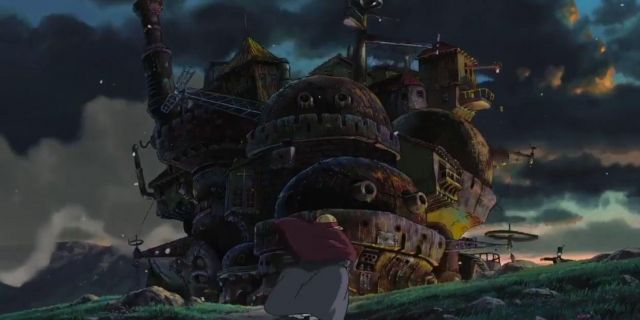Hayao Miyazaki’s Howl’s Moving Castle is a timeless classic that explores various concepts in a beautiful fantasy setting. It traverses several themes, including humanity, selfhood, compassion and belonging, and it derives the most enduring message from its ideas of war and the evils it creates. The movie is based on a book of the same name by Diana Wynne Jones. However, the Studio Ghibli movie’s plot focuses on Sophie, a young girl cursed by a witch who becomes an old woman.
Sophie therefore leaves her home and wanders alone until she starts living in Howl’s castle and learns more about the war as well as the world of magic. Miyazaki identifies as a pacifist and doesn’t shy away from expressing his distaste for the 2003 Iraq War. Thus, the movie starts with its analogs for the 2003 Iraq War.
How Does Howl’s Moving Castle Cover Pacifist Themes?

Madam Suliman, the strongest mage in the kingdom, works directly under the king to lead the war. Without caring about the consequences of the war, she craves more conflict and destruction. In this way, Miyazaki tries to portray that real-world conflicts are also arbitrary and fueled by the desires of the people sitting at the top. The ones dying in the war are unrelated to the decision-making, while those in power are reaping the benefits.
The movie’s pacifist themes are further exemplified in a scene where Howl and Sophie were standing on a beautiful field of flowers. However, the seemingly charming scene is interrupted by a warship flying past. Sophie asks Howl if it belongs to the enemy or their kingdom. However, Howl responds by asking a rhetorical question: “What difference does it make?” This depicts how wars harm everyone without bias. Howl hates war, and even though he is obligated to fight as a wizard, he never kills anyone even when he is under attack or wounded. Sometimes, Howl even fights both sides, portraying him as an antihero who uses aggression to promote his pacifistic tendencies.
How Howl’s Moving Castle Relates to the Iraq War

The Iraq War, lasting from 2003 to 2011, was a brutal conflict that took over 30,000 lives. In 2003, Miyazaki was invited to accept an Oscar for Spirited Away in the U.S. However, he rejected such a glorifying moment by saying that he did not want to visit a country that was bombing Iraq. Miyazaki beautifully chastised this war through Howl’s Moving Castle, which isn’t simply a sweet love story but also a medium for Miyazaki to criticize the invasion of Iraq that occurred while the movie was in production.
The movie openly depicts war as a unanimously bad thing, where no side is on the moral right. The main protagonist, Howl, uses two aliases and refuses to sacrifice his life in a pointless war. The movie never allows its viewers to feel sympathy for either of the warring nations and only shows the cruel aftermath of war. In the movie, war is fueled by the desires of people in power rather than any form of logic or justice. Furthermore, Howl’s curse portrays how humanity can be lost through all this fighting and that there is a looming point of no return for the heart of man.















Leave a Reply